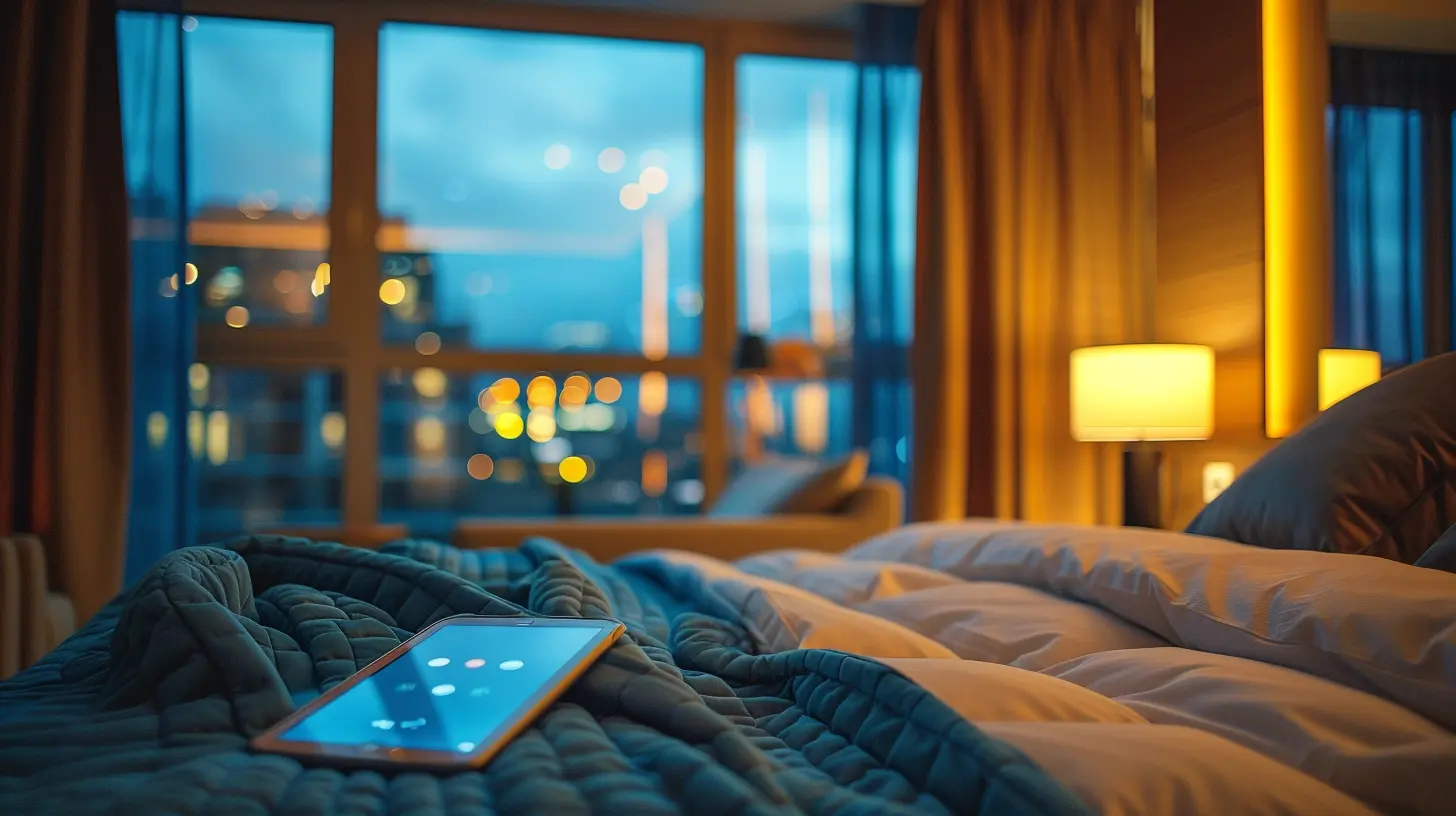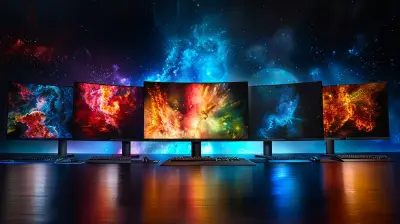Smart Displays in Hospitality: Enhancing Guest Experiences with Tech
7 November 2025
Hospitality and technology have always gone hand in hand. From online booking systems to mobile check-ins, innovation keeps reshaping the way we travel. But one tech trend is taking guest experiences to a whole new level—smart displays.
Imagine walking into a hotel room where the lights adjust to your mood, the TV greets you by name, and you can order room service with just a voice command. Sounds futuristic, right? Well, this isn’t sci-fi—it’s happening right now. Smart displays are transforming the hospitality industry, making stays smoother, more personalized, and downright magical.
So, let’s dive into how smart displays are changing the game and why every hotel should hop on this trend.

The Rise of Smart Displays in Hotels
Smart displays are interactive screens powered by artificial intelligence (AI) and the Internet of Things (IoT). They can be voice-activated, touch-controlled, or both. These devices aren’t just fancy gadgets; they're revolutionizing hotel stays by offering convenience, personalization, and seamless service.Hotels worldwide are integrating smart displays in lobbies, rooms, and even restaurants. Why? Because today’s travelers crave technology that simplifies their stay while making it more enjoyable.

Key Benefits of Smart Displays in Hospitality
1. Seamless Check-In and Check-Out
Let’s face it—no one likes long lines at the reception desk. With smart displays, check-ins and check-outs become hassle-free. Guests can scan their IDs, select their rooms, and get their digital keys without waiting in line. This makes arriving and leaving a hotel a breeze.2. Personalized Guest Experiences
One of the biggest perks of smart displays is personalization. Imagine entering your hotel room and seeing a welcome message with your name. The display remembers your preferred room temperature, lighting, and even TV channels. It’s like having a virtual concierge that knows exactly what you love.Hotels can also use AI-driven smart displays to suggest local attractions, recommend restaurants based on dietary preferences, or offer personalized room service suggestions. This level of customization makes guests feel valued and enhances their overall experience.
3. Voice-Controlled Convenience
Not a fan of fiddling with remotes or searching through menus? Smart displays integrated with voice assistants like Alexa or Google Assistant change the game. Guests can control room settings, ask for weather updates, or request housekeeping—just by speaking.“Hey Alexa, dim the lights and play relaxing music.” Sounds dreamy, right?
4. In-Room Entertainment Upgrades
Gone are the days of flipping through limited TV channels. Smart displays offer streaming services like Netflix, Hulu, or YouTube, so guests can watch their favorite shows seamlessly. Some hotels even allow guests to cast content from their smartphones onto the smart display, making in-room entertainment truly flexible.Not to mention, smart displays can provide information about hotel events, spa services, and city tours—keeping guests informed without needing to call the front desk.
5. Contactless Services for Safety & Hygiene
Post-pandemic, touch-free experiences are more important than ever. Smart displays help minimize physical contact, reducing the need for shared surfaces like menus and remote controls. Guests can order room service, request fresh towels, or schedule a wake-up call—all from a sleek touchscreen or voice command.6. Smart Hotel Room Controls
Ever wished you could control everything in your hotel room with a single device? Smart displays make that a reality. Guests can adjust curtains, lighting, air conditioning, and even set "Do Not Disturb" signs—all from one central screen.This level of control not only enhances comfort but also improves energy efficiency. Hotels can program smart displays to turn off lights and HVAC systems automatically when a room isn’t in use, reducing energy waste.
7. Multilingual Support for International Travelers
For international travelers, language barriers can be a challenge. Smart displays come with built-in translation features, allowing guests to interact with hotel services in their preferred language. Whether ordering room service or seeking recommendations, multilingual support makes communication effortless.8. Enhanced Communication with Hotel Staff
Need extra pillows? Have a question about the gym hours? Smart displays allow real-time messaging between guests and hotel staff, reducing wait times and improving service quality.Some hotels even use AI chatbots on smart displays to handle common queries, freeing up human staff to focus on more personalized interactions.

How Hotels Are Leveraging Smart Displays
Luxury hotels, boutique stays, and even budget-friendly chains are embracing smart displays to level up guest experiences. Here are a few examples:- Marriott Hotels: Integrating voice-activated smart displays for in-room controls and concierge services.
- Hilton’s Connected Room: Allows guests to personalize room settings through a smart display or mobile app.
- Yotel: Using smart displays to streamline check-in processes and automate room service orders.
These early adopters set the stage for a future where smart tech becomes the industry standard.

The Future of Smart Displays in Hospitality
We’re just scratching the surface of what smart displays can do. The future holds even more exciting possibilities:- AI-Powered Personalized Recommendations: Smart displays could analyze guest preferences more deeply, offering hyper-personalized suggestions for dining, activities, and spa treatments.
- Augmented Reality (AR) Integration: Imagine pointing your phone at a smart display to see AR-guided hotel tours or interactive city maps.
- Facial Recognition for Seamless Access: Some high-end hotels are experimenting with facial recognition to allow guests to unlock their rooms without a key or card.
- IoT-Connected Hotel Ecosystems: A fully connected experience where smart displays sync with wearables, smartphones, and even transportation services for a seamless travel experience.
Are Smart Displays a Must-Have for Hotels?
Absolutely! The hospitality industry is all about creating unforgettable experiences, and smart displays do just that. They enhance comfort, streamline services, and offer personalized touches that guests love.Whether you run a luxury resort or a budget-friendly inn, investing in smart displays is a forward-thinking move. Not only do they cater to tech-savvy travelers, but they also improve operational efficiency and boost guest satisfaction.
So, if you’re in the hotel business, it’s time to embrace this technology. Because in the end, happy guests mean glowing reviews—and that’s the key to long-term success in hospitality.
all images in this post were generated using AI tools
Category:
Smart DisplaysAuthor:

Reese McQuillan
Discussion
rate this article
1 comments
Selina McClure
This article beautifully highlights the transformative power of smart displays in hospitality. It's heartening to see technology enhancing guest experiences, making stays more comfortable and personalized. Embracing such innovations can truly elevate the warmth and efficiency of service.
November 7, 2025 at 3:54 AM

Reese McQuillan
Thank you for your thoughtful comment! I'm glad you found the article insightful—embracing technology really does enhance guest experiences in meaningful ways.


